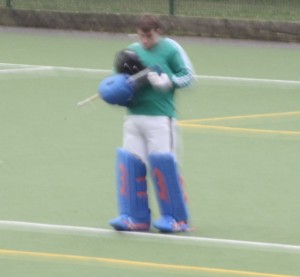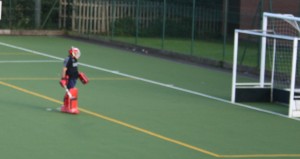I don’t particularly think it is (although it can be very frustrating behind a team with a poor record), but at times you’ve got to be a little controversial to make a point, especially in writing. Those saves that make you look flash or superman aren’t going to be in every game and as your playing life develops, you’ll probably start to reconsider how you think about the position! In training you will often have a lot to do, but during games, you may not, commanding your defence and stopping chances developing before they come to fruition. But really, the boredom affects your game in terms of your ability to concentrate, pay attention and be able to make the important, decisive save as it happens, whenever it occurs time wise during the game (say early on to help keep your team in with a chance of taking the lead, or near the end of the match, to ensure you win!).
Tom Millington looking a little bored as his team takes a short corner down the other end of the pitch!
Goalkeeping is boring
Well, to be honest, it can be. You may get games where you get to test your mettle and face a lot of shots, but otherwise, you won’t face that many shots. And it’s not about how many saves you make ultimately; it’s about being able to make the timely, crucial save at the right time! Playing behind a strong defence means you’re going to have little work to do but important work when you do; when something does get through, it’s potentially more dangerous to the score line and thus more pressure on you to ‘step up to the plate’!
At the highest level, the defence is so strong and team efforts so much and team work close knit, that you may only face few amount of shots or scoring opportunities to intercept. If you think about it, expecting to face lots of shots and being man of the match and showing your talent, is a quite a lot different to the expectations of having a single shot to save at the end of the game which could be the decision maker and yet we are expected to, have to, make the stop regardless! In ice hockey this is a lot different, with goalies expected to face up to 30 shots a game on a regular basis; in a match in the KHL (Russian pro league) this month, a goalie faced 60 shots, faced pretty much all of them and still lost! Heart breaking!
Hockey is a lot different in the way we face shots and are expected to deal with them. A lot like a premier league game in football where facing more than 10 shots is unheard of (Jaaskelainen faced about 12 for this seasons’ record recently against Tottenham!). Sorry to keep using football analogies! Yes, you still have to be ready for action as the speed of the game is such that you have to be keyed in to respond immediately, but maybe you can argue that you will have less shots to face, making it even more crucial (and demanding as a result!) that you make the stops despite how many you face. One shot and one conceded goal is all the difference it takes to change the game. And should be taken seriously!
Ex-Old Louts goalie Stuart Hendy gets so bored he turns around to check his goal is still there!!
Reduced amount of saves to make
If you have started out on a team where you regularly face a lot of shots and find it helps you get into the game as you ‘build up a rhythm’, you may find it difficult to playing on a strong team where the defensive structuring and play is so great that you will only be called upon a few teams in every game. If, like me, you prefer to see more shots to get comfortable in a game, then it’s going to be difficult (to say the least!) to be able to mentally prepare and ‘come up trumps’ when you do eventually see some action. A heavy workload is different to facing only a few but decisive shots and scoring chances. The less shots you face, the more the opposition have to be careful in well executing and taking them to ensure they score, whilst having an impact on the way you play; with your confidence and trust in yourself to make the few but decisive saves when necessary.
Having little to do
With few shots, it is even more critical that you can concentrate and be alert to make the save when a scoring chance does happen; making it more stressful and pressurised! You have to be ‘awake’ all game for when you do eventually see a shot! When you are called upon you have to make that save. Goalkeeping is more than just stopping shots; it is being able to make the important ones when they most matter! Your one totally decisive save is going to be the game changer and needs to be made for your team to take home the three points.
So even if you can use stats and records to work out a goalkeeper’s performance and who is better at shot stopping, arguably to some degree, it doesn’t matter how many saves you make: if you can’t make the crucial one that keeps the score in your team’s favour, then you’ve let your team down, essentially. Harsh but realistic! Not for the weak is goalkeeping! But I think as you get older, begin to peak and grow into the position, you can overcome the nerves and tense mentality to be confident in knowing when you will be called upon and strong mentally to make that save.
Boredom and concentration
Elite goalkeepers have an amazing attention span. Imagine having nothing to do all game and then having to make an all-decisive save to keep the score as a win or prevent it from being a loss. To be honest, I can admit to (even though I probably shouldn’t!) having difficulties with staying alert if there is not much action down my end of the pitch and can get a little bored, only to be caught out by something happening unexpectedly for me to react to! Elite goalkeepers have elite concentration. If they slip up mentally, they’re pretty much bound to make a mistake because you expect opposition at that level to have attackers that will exploit these mistakes; if they didn’t you’d be thinking they’re overhyped! So as a result they’re obviously going to be paying full attention the whole game, no matter what.
The concentration levels are intense. Goalkeeping is intense. Sport is intense, so is competitiveness and playing at the elite level, it’s going to be as intense as it gets! And if you want a clean sheet, should be too (whatever level you play!). You really have to concentrate. And concentrate hard, with all of your being and mind. Just like Tim Howard, who actually has Tourettes (well documented in fact http://www.foxnews.com/health/2010/06/16/goalkeeper-tim-howard-shuts-tourettes/), and is quoted often as mentioning that he has found that the level of concentration required to play in goal at the highest levels helps him overcome the negative side effects of this condition. At least, that’s what I’ve read and heard. This is in and of itself an amazing feat and not something to merely overlook or smirk at.
It also goes to show that if you want to achieve something badly enough, you’ll let nothing stand in your way! And self discipline (obviously very important if you’re a student athlete amongst other things and not letting anger boil over in a physical match say), much like concentrating, is especially part of this process. I thought I’d include that bit of lesser known goalie fact because it just goes to show how much you have to overcome to put aside the nervousness, pressures of goalkeeping and do all you can to focus on the game.
Ignoring the boredom and staying alert
The easiest, simplest and yet ridiculously difficult way is obvious: don’t think (removing any thoughts; positive or negative and eliminating worry), just read and follow the game and react to it. Don’t think, just do! I’ve been learning about Zen Buddhism (I’ve done a little of Buddhist meditation for personal reasons and also find it helpful for calming before a match, but nothing to this extent!) and how it can apply to goalkeeping. A lot like the way goalies across sports are looking at the mentality of golfers (who have an incredibly strong ‘mental game’ as expected!). When applied to hockey, the ability to think of nothing and just react and respond to the game as it unfolds is very handy. It’s refreshing and helps with focus, indescribably useful! So going from irritable or nervous or bored, I have taught myself to just totally focus on the game and nothing else. Pure focus. I recommend you research it! And it’s something I’ll hopefully write about in appropriate depth soon.
The idea is the ‘no thoughts thoughts’ way of thinking (yes Word that’s repetition, leave me alone!), where you abandon all thoughts to purely focus on what is happening in front of you, a lot like meditation in Yoga. By not thinking, you’re not over complicating things, you’re not over thinking (see de Gea’s struggles last season as a football analogy, can’t think of any goalkeepers in hockey struggling like that at the moment!), you just react and are able to make the right choices as a result. You take away the burdens and problems of nervous tension. Concentrating intensely without the chance to get bored; for the fully 70 minutes just focusing intensely on the game. Once you’ve finished, you can go back to random thinking and the generic stuff of whatever else goes on in your head! But in the game, you give it your all. It removes ALL distractions and thus will help you concentrate to play at your best!
Pay attention! Don’t get bored!
Not getting bored might be easier said than done, but if you teach yourself to eliminate thoughts or boredom and just concentrate totally, with all of your mind and focus, you should be able to do it every game. Concentration levels is something I tried to write about before when I started writing for the Keepers Resources site (it’s in another article somewhere!), but it depends on you as a goalkeeper. Some goalkeepers find it easy to concentrate with nothing happening, otherwise don’t and want to be stopping a lot of shots! Games don’t go that way all the time, so it’s a good idea on working out how to concentrate so when that scoring opportunity does present itself, you are ready to react accordingly.

